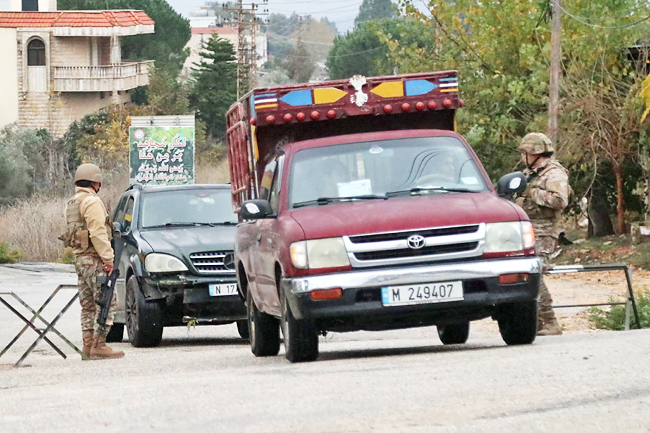BEIRUT (AFP) – Lebanon’s military deployed troops and tanks across the country’s south yesterday as a ceasefire in the Israel-Hezbollah war largely held for a second day.
The truce ended a war that began a day after Hamas’s unprecedented October 7, 2023 attack on Israel.
Israel shifted its focus from Gaza to Lebanon in September to secure its northern border from Hezbollah attacks, dealing a series of staggering blows.
Under the terms of the ceasefire, the Lebanese army and United Nations (UN) peacekeepers were to become the only armed presence in south Lebanon, where Hezbollah has long held sway.
A Lebanese army source said its forces were “conducting patrols and setting up checkpoints” south of the Litani River without advancing into areas where Israeli forces were still present.
In the border village of Qlaaya, residents threw rice and flowers to celebrate the arrival of Lebanese soldiers.

“We only want the Lebanese army,” chanted the residents as they clapped and cheered for the troops and waved the Lebanese red, white and green flag.
Since the ceasefire took effect on Wednesday, tens of thousands of Lebanese who fled their homes have headed back to their towns and villages, only to find scenes of devastation.
“Despite all the destruction and the sorrow, we are happy to be back,” said Umm Mohammed Bzeih, a widow who fled with her four children from the southern village of Zibqin two months ago.
“I feel as if our souls have returned,” she said, visibly exhausted as she swept up the shattered glass and pieces of stones that carpeted the floor.
While there was joy around Lebanon that the war has ended, it will take the country a long time to recover.
Even prior to the conflict, it had been wracked for years by political and economic crisis, with World Bank data from earlier this year indicating poverty had tripled in a decade.
Yesterday, there was a glimmer of hope as the official National News Agency reported Parliament would meet to elect a president on January 9, following a two-year vacuum.
Hezbollah proclaimed on Wednesday that it had achieved “victory” in the war against Israel, after the truce took effect.
But the war saw Israel deal Hezbollah a string of unprecedented blows, key among them the killing in September of its longtime leader Hassan Nasrallah.
Other losses suffered by the group include the death of a string of other top commanders, as well as the killing of the man touted to succeed Nasrallah, Hashem Safieddine.
Hezbollah lawmaker Hassan Fadlallah told AFP his group was cooperating on the army’s deployment in the south.
There is “full cooperation” with the Lebanese state in strengthening the army’s deployment, he said, adding the group had “no visible weapons or bases” but “nobody can make residents leave their villages”.







